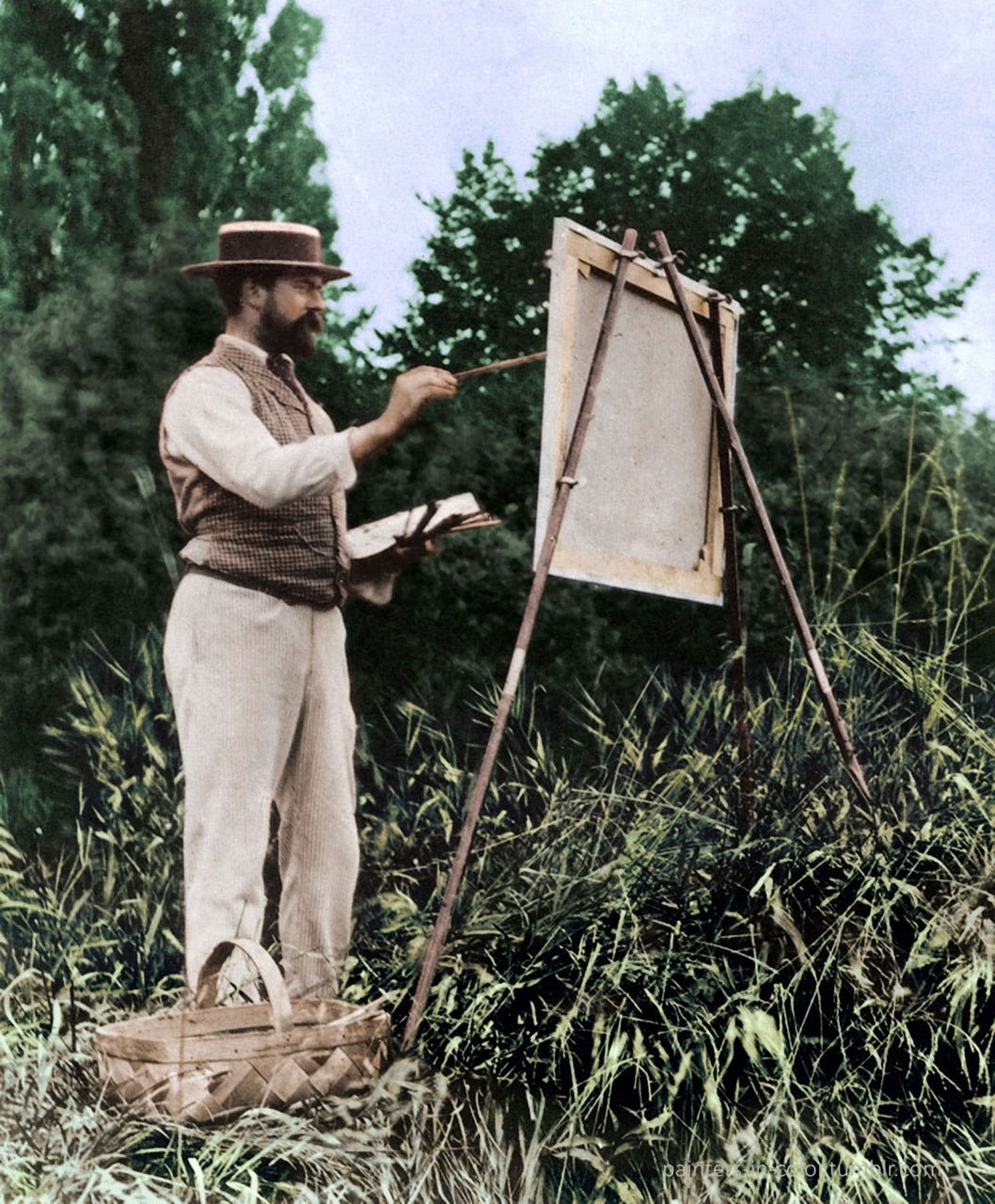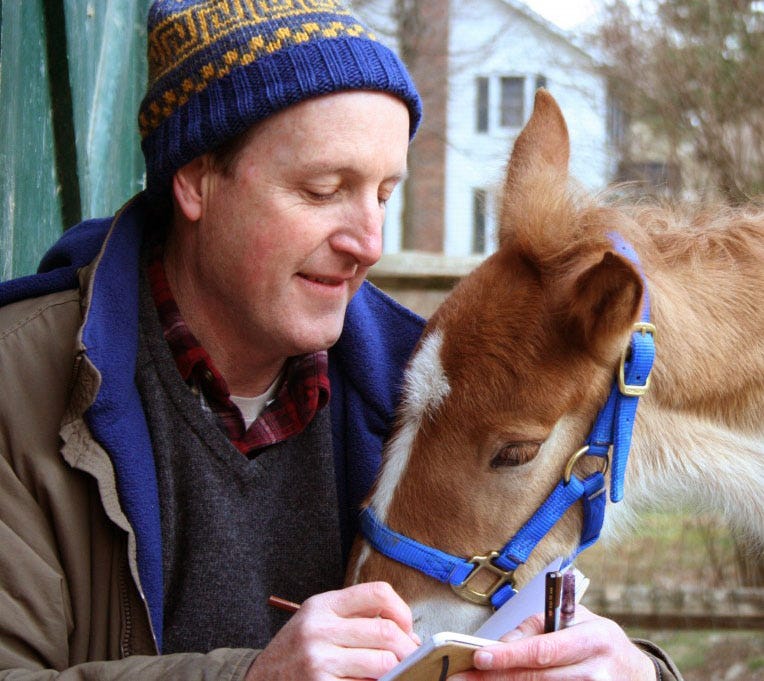"The greatest thing a human soul ever does in this world is to see something, and tell what it saw in a plain way." —John Ruskin from Modern Painters
Analyzing why we do something is the key to doing it more happily, more honestly, and more ably. It’s also a good strategy for overcoming blocks. Have you been wanting to sketch more but just don’t get around to it? Are you a pro who wants to reignite some of the fire that you had when you were younger?
John Singer Sargent
Then this post is for you. Let’s dig in to the ten top reasons why we bother to turn the great outdoors into our art studio. Why do we allow ourselves to get sunburned, mosquito-bitten, and windblown in the process?
1. Skill Building & Artistic Discipline
Some of you are eager to experiment with limited palettes. Others are interested in trying notan or you may want to learn character design. When we leave the studio, we find subjects that will blow•our•minds with their richness. The changing light and time pressure sharpen our observation, accelerate our decision-making, and boost our confidence. To quote Boudin, "Everything that is painted directly and on the spot always has a strength, a power, a vividness of touch that one does not find again in the studio." —Eugène Boudin (1824–1898, painter and mentor to Monet)
2. Social Connection & Community
Going out with a group is a chance to meet like-minded artists, to paint together, and to share war stories. This is a prime motivation of Urban Sketchers, and it’s why people sign up for plein-air conventions, paint-outs, and even sweetheart meetups. For years, Jeanette and I knew each other just as sketching buddies. One of my greatest joys was concentrating next to her for long minutes without talking, and then meeting up over a cheap lunch afterwards.
3. Escape from Worry, Dullness, or Social Media
I forget everything else when I’m sketching. I forget about taxes, medical bills, and brain clutter. Recently I’ve heard a lot of people say that sketching takes them far away from their cellphones and laptops. John Singer Sargent turned to outdoor painting to escape the headaches of formal portrait painting, but of course he always leaned into the challenges. And Italian tenor Enrico Caruso sketched while he was waiting to go onstage. But for him, too, it became a serious calling.
Caruso sketching caricatures at a charity fair. Look at that face of intense concentration.
4. Healthy Lifestyle Choice
Sketching makes us leave our comfortable sofas and routines. When we set up to sketch we take a deep breath, squint, and perch for hours on a folding chair. That’s healthy for all of us at any age. But it’s more than a lifestyle choice for seniors who see themselves in those golden, fuzzy advertisements. The only soundtrack you’ve got is real world. Painting outside offers a calming, screen-free space to slow down, breathe, and be present. I love the blank mind it gives me.
5. Creative Gateway
For new artists, sketching is a low-pressure way to get started making art. For others who are returning to art after a long absence, it’s a doorway to their dormant creative lives. The pressure of being on location, with all the dynamics and chaos, often calls up creative reserves that would have been inaccessible in the studio.
6. Career Opportunity
For a lot of artists, painting on location is how they make their living. Outdoor work can lead to sales, teaching material, or exhibition content. I suppose that’s true for me, too, even though I almost never sell my sketches directly, but rather make books and posts and videos about working from life, and all that somehow adds up to a living.
Beware of this motive, though. Many promoters of plein-air sketching push this angle relentlessly, making people feel like their art isn’t valid unless they can sell it or win a prize with it. Those sketch-mongers make money on the the whole enterprise of awards, shows, or galleries, especially if they set themselves up as gatekeepers. If all we’re thinking about is selling something or winning a prize, it really limits the subjects and approaches we’re willing to try.
7. Unique Encounters with People, Places, and Animals
Sketching allows us to interact with the world around us in deeper ways—like the time I found myself sketching like a madman on a drawbridge going up. Or the time I sketched a couple of “home boys” from the Santa Monica Locos. This is what Tom Kinkade and I called “Hoisterism.” Between 1980 and 1982, Tom Kinkade and I used sketching as a ticket to novel situations, like sketching in a wrench factory.
8. Visual Research
Painting or drawing gives us a reason to learn about things we might otherwise pass by. For scientists, sketching can clarify the understanding of form, symmetry, or pattern. Think of Leonardo da Vinci’s notebooks, which synthesize his insights into how things work and why they’re made the way they are.
9. Travel Journaling
Sketching on the go turns trips into records of adventure. In 1985, Jeanette and I took a trip to England with a pencil sketchbook and a tape recorder. We intentionally left our camera at home. Not having a camera forced us to turn to our sketchbook to capture what inspired us.
10. Legacy & Memory
A sketchbook captures experiences in amber. It renders immortal the pathways of our consciousness. When we look back through an old sketchbook we get glimpses of a lost world. Its a good way for our descendants and heirs to understand what we lived through when we were their age. That’s why a sketchbook is such a rare gift to your kids and grandkids—and to yourself.
Winslow Homer
Now it’s your turn.
Those are the main motives I could think of, but I’m sure I missed a few. Did I overlook the thing that drives you to paint or draw outside? Are you inspired to try something new? Share your thoughts in the comments, which, I’m happy to see, has become a healthy forum for online discussion.









I found Ruskin's quote to be pretty uninspiring. Far better was the quote from J. Gurney in the book, The Artist's Guide to Sketching: "The more we sketched, the more we began to realize that sketching is both the motivation and the reward for experiencing new things."
I sketch because I have too. Whatever I'm drawing it becomes mine when I sketch it. It's not just on paper but in my mind. A connection to an experience I'll remember...